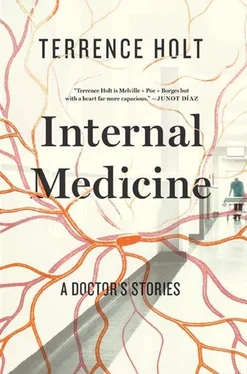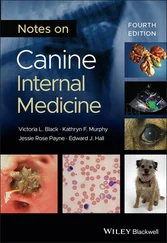“I took all this home with me, but in the few hours I had to get myself ready for a day in the clinic, there was no time to think. Somewhere in the back of my mind I had a vague notion about ‘doing something.’ But whenever I tried to bring that notion out into the light of day it refused to take on any solid form.
“What was there to do? He was an oncologist, after all: oncology patients die. I supposed I could do some reading, see if the regimens he’d been prescribing were at least on the level. For all I knew he was some kind of laetrile-peddling quack, despite the German credentials. I left for the clinic that morning with the intention of spending lunch in the hospital’s tiny library, but of course there was no time for lunch, and when my last patient had finally left and my last note was on the chart, it was past seven. I shelved the notion for tomorrow.
“Tomorrow followed tomorrow, and I confess my intention to ‘do something’ languished there for months. Then a call from the father of one of my patients, a healthy if slightly accident-prone ten-year-old boy I hadn’t seen since his previous birthday, dragged the whole mess back into view.
“The father’s tale began in the emergency room, where Robert had been brought several months earlier with a fracture of the proximal humerus acquired while falling from a tree. In the course of the initial assessment, the admitting orthopod had ordered a routine set of films, which had revealed that Robert’s fracture was only a symptom of a more serious problem. He had a Ewing’s sarcoma, an extremely rare bone cancer of children.
“At that time, the treatment of choice was amputation, and the orthopod fully expected to be performing one before nightfall, until events supervened in the form of Dr. Schott.
“What he had been doing in the emergency room I do not know, and the record does not cast any light on the question either. I think Schott simply volunteered himself to Robert’s parents.
“According to the father, Schott offered an alternative to amputation. As part of an investigational trial, he said, he had a drug that could be effective in Ewing’s. He had been persuasive. The orthopod had been uncooperative. The parents went with Schott and his more enthusiastic view of the situation, and Robert had been scheduled for induction therapy the following day.
“And it had worked. We had no scintigraphy back then, but X-rays obtained six weeks after induction showed no tumor where the tumor had been, and once Robert had recovered from the anemia, the mucositis, and the hundred other horrors Schott’s cocktail had afflicted him with, he had been up and toddling about. He had no eyebrows, and the hair that grew back in on his scalp was a ‘weird, fuzzy stuff,’ his father said, but they didn’t care: their boy was alive, and whole.
“Two months later, Robert had begun complaining of pain in his left thigh. X-rays showed a large mass erupting out of the femur.
“At this point, the father’s account grew a little sketchy. Someone had wanted to call in the orthopod, someone else had argued against it. Schott’s was the only unambiguous response. He had offered another round of chemotherapy. Another experimental regimen. At which point sanity (which had been one conspicuously missing feature of the case) returned long enough for the boy’s mother to suggest a call to me.
“I listened to this tale with a mixture of disbelief, embarrassment, and anger, all of it at Schott. You have to remember: this was in the days before doctors advertised. Under that dispensation, the idea of a specialist trolling for patients in the ER was hard to stomach. To advise against a necessary, possibly life-saving amputation was unconscionable. To persist in this line of approach after incontrovertible failure was unforgivable.
“I stewed about the matter overnight, and early the next morning I was in Robert’s room at the hospital. I had to go see for myself.
“What I found there almost made me wish I hadn’t. The last time I’d seen Robert he’d been a robust boy just turned ten — an age I’ve always thought of as the very heart of childhood: old enough to have a fully developed personality, but still wholly in the light of innocence, with no shadow yet of adolescence, or anything beyond.
“That was all past for Robert. He lay there as listless as a child can be only when he’s truly ill. He was cachectic, and looking even more diminished for being in an adult bed. His eyes were sunken, his mouth the angry red you see in scarlatina; I had never really seen a case of chemotherapy-induced mucositis before then. He showed no sign of recognizing me as I entered the room, only whimpered and turned away.
“It was the mother that grabbed my attention. Ordinarily, you find a parent in a kid’s room at that hour of the morning, they’re slumped in the bedside chair, looking almost as bad as the patient. She wasn’t in the chair. She was standing at the foot of the bed, looking like she’d stood there all night. As I came in she turned and looked at me. No expression, nothing in her face, just: See. See my son . I felt the blood rise roaring in my ears. It was all I could do to stay in the room.
“I was about to ask, Where is Schott? , and was struggling to find a tone of voice somewhere on the civilized side of murderous to say it in, when the door opened at my back. I turned to find the man himself frozen in the doorway, taking in the tableau the three of us made in the room.
“His face was something of a tableau itself, registering surprise, confusion, and a sneaking guilty expression. I have no idea what my face showed; it didn’t occur to me until much later that the expression on Schott’s could have told me.
“We stood there, Schott and I, for much too long, before Schott cleared his throat in a complicated Germanic way, and explained to Robert’s mother that his colleague and he would be consulting down the hall for a little while. Then he stepped briskly to one side, straightened his back at the door, and made a gesture as if showing me the way: a strangely military performance that made me want to wring his neck for involving me in his playacting. I felt my shoulders hunch self-consciously under the woman’s gaze as I left the room.
“I held back until we had reached a vacant consult room at the end of the hall. I don’t remember what I said: it was incoherent, most of it, because at that point I really didn’t have much to express beyond an intense moral revulsion at what I’d just seen. Schott watched me splutter with that watery gaze of his, much calmer than I wanted him to be, and waited until I ran out of indignation.
“It was not what I thought, he told me. He had gathered enough from my expostulations to understand that I suspected him of soliciting patients in the emergency room, and I think he also sensed my skepticism about his research. As to the former, he explained that he was in fact looking to enroll subjects from the ER: that was how the protocol was written, how it had been approved; he could show it to me, if I wanted. I waved the offer aside, not sure I would recognize a protocol if I saw one. He also assured me that he was in fact named on a grant from the NCI, making this hospital a regional center for an investigation of the use of a new platinum-based compound in combination with vincristine, procarbazine, nitrogen mustard, and prednisone in the treatment of leukemia — or something like that. I may have forgotten some of the names, but that was the general idea.
“I backed away from all this chemical flummery, partly because I wasn’t going to win any fights on that terrain, but also because it was all beside the point. The point, I said as acidly as I could manage, that he seemed to be missing, was that a child was being tortured. For what?
Читать дальше












